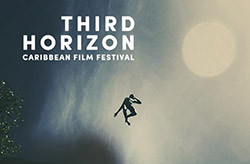 “Nuestro objetivo final es nada menos que lograr la integración del cine latinoamericano.
Así de simple, y así de desmesurado”.
“Nuestro objetivo final es nada menos que lograr la integración del cine latinoamericano.
Así de simple, y así de desmesurado”.
Gabriel García Márquez
Presidente (1927-2014)


-

El cortometraje documental haitiano Papa Machete participa en el Festival de Cine Caribeño Tercer HorizontePor Erin C.J. RobertsonEl llamado Agosto Negro marcó el 212 aniversario de la Revolución Haitiana de 1791 a 1804 conducida por Toussaint L’Ouverture, la única sublevación de esclavos exitosa registrada en la historia moderna.
Haití se convirtió en la primera república negra independiente. Sin embargo, hasta el día de hoy, Francia obliga al país a pagar una “deuda por la independencia” -o compensaciones que ascienden a miles de millones, para indemnizar a colonizadores ya fallecidos por la pérdida de los esclavos que obtuvieron la libertad por parte de Napoleón Bonaparte.
Venciendo enormes desafíos y contando con pocos fusiles y municiones, los esclavos de ascendencia africana blandieron el machete -el mismo instrumento que utilizaban para trabajar en los cañaverales- para conquistar su libertad.
Es a partir de este legado que el cortometraje documental Papa Machete, con guion y producción ejecutiva de Jason Fitzroy Jeffers, nos presenta al ya desaparecido maestro del machete el “Profesor” Alfred Avril, quien enseña a un selecto grupo sus técnicas de combate, preservadas con mucho celo en Haití.
“No utilizó ese don para matar personas, pero lo poseo”, revela Avril en el filme. “De esta forma, si alguien me ataca, entenderá que se pondrá en una mala situación. Los cortes pueden hacer sangrar”.
El corto, de una exuberante fotografía, ofrece un retrato de Avril mientras instruye sobre los aspectos prácticos y espirituales del machete, un instrumento especialmente valioso para los campesinos haitianos como él. A través de sus esfuerzos para mantener y educar a sus once hijos, Avril demuestra su lealtad a Haití. Sus hijos Roland y Jean-Paul, ambos destacados practicantes del arte marcial del machete, proyectan hacia el futuro la memoria de Avril y el pasado victorioso de Haití.
“Ellos serán los que verán si se produce un cambio”, afirma Avril impasiblemente. “Mis hijos serán los que presenciarán si las cosas mejoran”.
Este íntimo retrato cinematográfico, dirigido y editado por Jonathan David Kane, un hit del circuito internacional de festivales en 2014 (Sundance y Toronto, entre otros), se presenta ahora en la primera edición del Festival de Cine Caribeño Tercer Horizonte. El evento proyectará ocho largometrajes y nueve cortos caribeños del 29 de septiembre al 2 de octubre.
 Award-Winning Haitian Short Film ‘Papa Machete’ Is Now Streaming Ahead of Third Horizon’s Inaugural Caribbean Film Fest
Award-Winning Haitian Short Film ‘Papa Machete’ Is Now Streaming Ahead of Third Horizon’s Inaugural Caribbean Film Fest
By Erin C.J. Robertson
Black August marked the 212th anniversary of the Haitian Revolution of 1791 to 1804 led by Toussaint L’Ouverture—the only successful slave rebellion in modern recorded history.
Thus Haiti became the first independent Black republic in the world. However to this day, France forces Haiti to pay an “independence debt”—or reparations—totaling billions, to compensate long-dead colonists for the slaves who had won their freedom from Napoléon Bonaparte.
Overcoming incredible odds, having few guns and ammunition, slaves of African descent wielded machetes, the very tool they used to labor on sugar plantations, to achieve freedom.
It is from this rich legacy that short doc Papa Machete, written and executive produced by Jason Fitzroy Jeffers, introduces us to late tire machétt master “Professor” Alfred Avril who taught his fighting technique, often guarded in Haiti, to a select few.
“I don’t use this gift to kill people, but I have it,” Avril reveals in the film. “So if you attack me…Understand? You’ll be in a bad way. If you are cut, the blood will flow.”
The short, boasting lush cinematography, paints a picture of Avril who instructs on the practical and spiritual nature of the machete, especially valuable for Haitian farmers like himself, according to the press release. Through his efforts to provide for and educate all eleven of his children, Avril demonstrates his allegiance to Haiti. His sons Roland and Jean-Paul, both accomplished machete martial artists, carry forth into the future the memory of Avril and Haiti’s victorious past.
“They are the one’s who will see if things change,” Avril says chillingly. “[My sons] are the ones who will see if things get better.”
A hit on the 2014 international film festival circuit, including Sundance and Toronto International Film Festival (TIFF), the Jonathan David Kane-directed and edited intimate portrait is now streaming ahead of Third Horizon’s inaugural Caribbean Film Festival.
A passion project of Jeffers, and organized by a collective of Miami and Brooklyn-based Caribbean creatives, the film festival spotlights eight features and nine short films.. If you’re in Miami, be sure to check it out, running from Sept. 29 until Oct. 2.
Resumen por: Fidel Jesús Quirós (traducido del inglés)
(Fuente: Okayafrica.com)
















